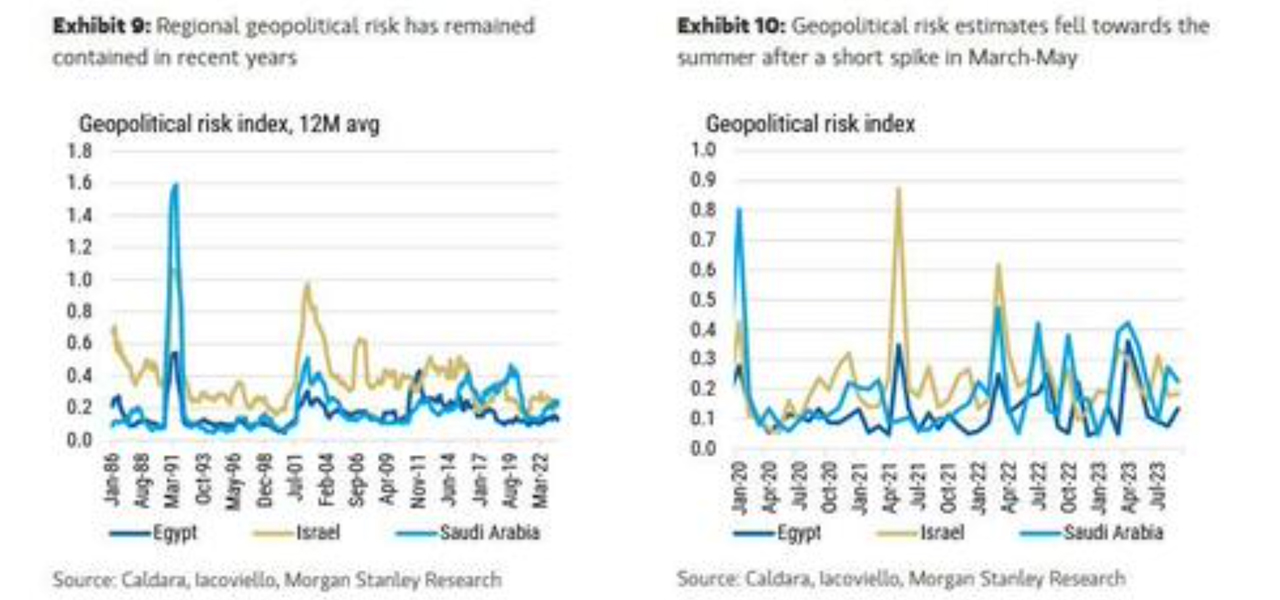
As the crisis in the Middle East continues to unravel following an unexpected assault on Israel by Hamas, prominent U.S. investment banks are recommending vigilance and adaptability. A closer look at the analysis from JPMorgan and Morgan Stanley gives us an understanding of Wall Street's interpretation of the ongoing events and their potential influence on worldwide markets.
Geopolitical Risks Amplify: The Perspective of Morgan Stanley's Market Analyst
Morgan Stanley's global head of fixed income research, Michael Zezas, has communicated to clients that the path ahead is unclear, despite widespread speculation about the potential for the conflict to escalate and involve additional nations. He recommends embracing the uncertainty as a means to attain clarity, highlighting that geopolitical risks have been on the rise worldwide due to policies implemented by governments to deter the strengthening of adversaries.
According to Zezas, the militant assault exacerbates this uncertainty, raising the risk that several nations with significant economic influence could become engaged. While he emphasizes the possibility of containment through various strategies, Zezas also outlines three likely market implications in a scenario where uncertainty continues to increase and governments take action to protect their interests.
These implications include an increase in corporate spending driven by national security, possible mispricing of risks in emerging Middle East sovereign credits, and potential spikes in oil prices. Zezas also warns that an oil price shock resulting from supply disruptions could strain regional finances, even in the absence of direct actions against production.
JPMorgan's Approach: Geopolitical Crises and their 'Limited' Long-term Effects
Madison Faller, a global investment strategist at JPMorgan, suggests a similar cautionary approach, highlighting the potential for escalation and the impact on natural resources as the most visible market linkage. She points out that neither of the conflicting parties plays a significant role in oil production, and the current balance between supply and demand has kept prices stable. However, she warns that this balance could shift if key routes, such as the Strait of Hormuz, were to be affected.
Faller asserts that markets have weathered geopolitical crises in the past, with historically limited long-term impacts. She encourages a focus on fundamentals such as inflation, rates, fiscal efforts, and corporate strength. Coupled with reasonable valuations, Faller perceives opportunities in equities and high yields as compensation for uncertainty. Her primary advice is to stay invested according to goals, as diversified portfolios have proven profitable through numerous challenges.
Market Reactions to Escalating Middle East Tensions
During the intensifying tensions in the Middle East last week, both stock markets and cryptocurrencies experienced a downturn. In contrast, precious metals, particularly gold and silver, saw a significant rise. Gold surged over 3% on Friday, with silver increasing by more than 4% against the U.S. dollar. Bond prices rose, leading to a dip in the U.S. Treasury 10-year yield. Meanwhile, the oil market recorded its most substantial weekly rise since the start of 2023. Notably, defense companies such as L3Harris Technologies, Lockheed Martin, and Northrop Grumman saw a sharp increase in their share value over the week.
We invite you to share your views on the market analysts' perspectives regarding the Middle East conflict and its impact on global markets. What are your thoughts on this topic? Please share your insights in the comments section below.

Frequently Asked Questions
What is the tax on gold in Roth IRAs?
Investment accounts are subject to tax based only on their current value and not the amount you originally paid. Any gains made by you after investing $1,000 in a stock or mutual fund are subject to tax.
If you place the money in a traditional IRA, 401(k), or other retirement plan, there is no tax when you take it out. Capital gains and dividends earn you no tax. This applies only to investments made for longer than one-year.
The rules governing these accounts vary by state. In Maryland, for example, withdrawals must be made within 60 days of reaching the age of 59 1/2 in order to qualify. In Massachusetts, you can wait until April 1st. New York has a maximum age limit of 70 1/2. To avoid penalties, plan ahead so you can take distributions at the right time.
What precious metal should I invest in?
This question is dependent on the amount of risk you are willing and able to accept as well as the type of return you desire. Although gold has been considered a safe investment, it is not always the most lucrative. If you are looking for quick profits, gold might not be the right investment. If you have time and patience, you should consider investing in silver instead.
If you don’t desire to become rich quickly, gold may be your best option. Silver may be a better option for investors who want long-term steady returns.
Can I hold a gold ETF in a Roth IRA?
Although a 401k plan might not provide this option, you should still consider other options like an Individual Retirement Account (IRA).
An IRA traditional allows both employees and employers to contribute. A Employee Stock Ownership Plan, or ESOP, is another way to invest publicly traded companies.
An ESOP can provide tax advantages, as employees are allowed to share in company stock and the profits generated by the business. The money you invest in the ESOP will be taxed at a lower rate than if it were directly held by the employee.
You can also get an Individual Retirement Annuity, or IRA. You can make regular payments to your IRA throughout your life, and you will also receive income when you retire. Contributions to IRAs can be made without tax.
Statistics
- This is a 15% margin that has shown no stable direction of growth but fluctuates seemingly at random. (smartasset.com)
- (Basically, if your GDP grows by 2%, you need miners to dig 2% more gold out of the ground every year to keep prices steady.) (smartasset.com)
- Gold is considered a collectible, and profits from a sale are taxed at a maximum rate of 28 percent. (aarp.org)
- Instead, the economy improved, stocks rebounded, and gold plunged, losing 28 percent of its value in 2013. (aarp.org)
- If you accidentally make an improper transaction, the IRS will disallow it and count it as a withdrawal, so you would owe income tax on the item's value and, if you are younger than 59 ½, an additional 10% early withdrawal penalty. (forbes.com)
External Links
investopedia.com
- Do You Need a Gold IRA to Get Retirement?
- What are the Options? Types, Spreads, Example, and Risk Metrics
cftc.gov
finance.yahoo.com
wsj.com
- Saddam Hussein's InvasionHelped Uncage a Bear in 1990 – WSJ
- You want to keep gold in your IRA at home? It's not legal – WSJ
How To
Guidelines for Gold Roth IRA
Start saving as soon as possible to save for your retirement. You should start as soon as you are eligible (usually at age 50) and continue saving throughout your career. It's vital to contribute enough money each year to ensure adequate growth on an ongoing basis.
Also, you want to take advantage tax-free options such as a traditional 401k, SEP IRA or SIMPLE IRA. These savings vehicles enable you to make contributions while not paying any taxes on the earnings, until they are withdrawn. These savings vehicles can be a great option for individuals who don't qualify for employer matching funds.
The key is to save regularly and consistently over time. You'll miss out on any potential tax benefits if you're not contributing the maximum amount allowed.
—————————————————————————————————————————————————————————————–
By: Jamie Redman
Title: Uncertainty in Global Markets as Middle East Tensions Escalate
Sourced From: news.bitcoin.com/investment-banks-see-uncertain-path-ahead-as-middle-east-crisis-unfolds/
Published Date: Mon, 16 Oct 2023 14:00:32 +0000
Related posts:
 Predictions For Bitcoin And World Markets With The Upcoming FOMC Meeting
Predictions For Bitcoin And World Markets With The Upcoming FOMC Meeting
 Global Market Shocks: U.S. Equities and Cryptocurrencies Stumble as Middle East Tensions Escalate; Oil and Metals Rally
Global Market Shocks: U.S. Equities and Cryptocurrencies Stumble as Middle East Tensions Escalate; Oil and Metals Rally
 7 Best Gold IRA Companies 2023 (Ranked by customer reviews)
7 Best Gold IRA Companies 2023 (Ranked by customer reviews)
 Unsettling Tides: SHIB Plummets to a Four-Month Low Amid Crypto Market Uncertainty
Unsettling Tides: SHIB Plummets to a Four-Month Low Amid Crypto Market Uncertainty












